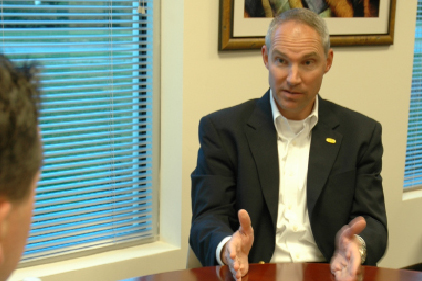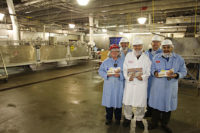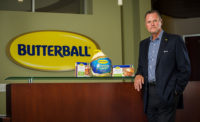Butterball’s world-class opportunity

Hanacek: What is your early impression of Butterball stepping into your new role that started in September?

|
|
"This company is already a world-class company, and we plan to make it even more world-class than it is," said Brenneman.
|
Brenneman: I was one of the Seaboard representatives on the Butterball board after Seaboard bought into the company, so I was exposed to Butterball at a very high level. Having said that, I got to know about not only the company and what they were all about but also the people. In April when Butterball’s prior CEO [Keith Shoemaker] left, I was asked to fill in on an interim basis with one of the board members from the Maxwell Foods group in a co-CEO situation, if you will. What that allowed me to do was spend a lot more time here and understand a lot more about what Butterball was — and even some of what it wasn’t — and also to spend time with the people and understand them better.
Hanacek: So what did you find when you began to understand more about the company in that interim role?
Brenneman: What I saw, quite frankly, is similar to what made Seaboard Foods successful. There were a whole bunch of factors, but if you look at it from a very top level, they have a great business plan; they have a lot of really good assets, most of which they built; and they have a lot of great people. When you combine all that, you have the makings of a successful organization, and that’s what we had [at Seaboard].
As I then spent some time here at Butterball, I saw that Butterball has a lot of those same things. It has a good business plan, but I think we can fine-tune it to make it better. It has a lot of really good assets. And Butterball has a lot of really great people here. The same components I saw at Seaboard are here, but Butterball had one more component: It has an iconic brand that has a lot of potential. So Seaboard saw in the acquisition the same things I got to see on the interim basis, and that is, there’s a lot of potential and opportunity here.
Hanacek: Why do you think you were tabbed to be the CEO of Butterball, at the end of the day?
Brenneman: That’s a really good question, and there are a lot of people that make an organization successful — it’s never one person. Clearly, the Seaboard Foods ownership was comfortable with what we’d done at Seaboard Foods, so 50 percent of them were very familiar with what my skills were, and what my skills weren’t, quite frankly. On the flip side, through the interim period, the Maxwell Foods group became comfortable with me and how I operate. But I think the other thing is — and again I give all the credit for it to the 4,700 people at Seaboard Foods — the proof is in the pudding. That organization has been pretty dog-gone successful, and it’s those 4,700 people who made it very successful at the end of the day.
Hanacek: What has kept you most busy through the Seaboard-to-Butterball transition, and how have you tried to build off what you’ve learned in the process?
Brenneman: If you look at Butterball historically, it had production that was owned by Goldsboro Milling / Maxwell Foods and Murphy Brown / Smithfield, and it had some of its own production in the Midwest that came as part of the ConAgra piece when it was purchased. Looking at it within that context, Butterball wasn’t truly an integrated company until all of that was folded in.
Most of that happened when Seaboard got involved in the company, but in August 2011, there was still a component of the Midwest operation that was owned by an outside group. That was acquired Aug. 29, 2011.
So as of that date, it’s really the first time in a very, very long time — all the way back to the early years of Butterball — it’s been truly an integrated company. That’s what we built at Seaboard, and I’m really excited not only about the components I mentioned earlier, but also the fact that Butterball is now truly integrated.
Hanacek: Do you foresee that new fully integrated system changing the way Butterball does business then? Is there a significant difference between how the company operated previous and will operate moving forward?
We’ll be making decisions based on a truly integrated basis now. That means we’ll step back and look at what’s best for the whole of the company as opposed to each individual component. As you know, when you talk to producers, they’ll have one goal, and processors have another goal, and further-processors and sales and marketing also have other goals. But when you can bring all that together, I believe that you can actually get a lot of quality input from those different areas, and ultimately make better decisions overall. So I’m excited about the fact that we can get everyone working together and thinking as a truly integrated company.
Hanacek: Do you think this new way of thinking and doing is going to be a drastic change to the company’s mindset or culture?
Brenneman: I think the key things that have made Butterball successful is, it has a great brand, a high-quality product and a very safe product. That’s what Butterball is, delivering high-quality, safe products for consumers. That part of Butterball will not change, clearly. In terms of getting the culture to think more as an integrated company, I believe that’s something for which there is some opportunity to tweak or fine-tune.
It’s not as though there will be wholesale changes, it’s just as simple as getting people to think and ask questions a little differently. We’re going to focus on continuous improvement. The fact that we’re really good in many cases at delivering those high-quality, safe products for consumers helps, but we’re going to get even better.
Hanacek: Do you believe that Butterball finally has reached a point at which it can operate and plan on a stable future? Will the stability open any doors for the company, in your view, or really will there be no real noticeable change?
Brenneman: First, you have two owners now who are not only aligned in their thinking, but they’re also very committed to this business. But the unique thing about having a partnership, as opposed to one owner, is you get the strengths of both parties involved, and we really have an alignment of both parties to move the company forward.
I can’t say that, in two months, we have some grandiose plan for what we’re going to accomplish through some big acquisition or anything like that, but what I can say is, I wouldn’t be here if there wasn’t an alignment of the ownership group and a commitment by both parties to this company’s future success. I believe there is a lot of opportunity, and I’m excited to get after it.
You’ve seen some of the changes already in the last few months. This is not necessarily something we like to do or want to do, but we announced the closing of the Longmont facility and consolidation of those operations into Mount Olive and Jonesboro, simply to create a more efficient, effective organization. Now, Butterball as a whole can become a more competitive, more efficient organization with a better position in the industry as a result. That’s an example of how we have to look at the company and determine what we can do better and not rest on our laurels, across the board. We’re going to continue to get better.
Hanacek: What have you communicated in your first few months to the Butterball employee base in the face of change?
Brenneman: I had the opportunity in the first two months to go around and meet with virtually all the salary and clerical people throughout the entire Butterball organization, from the live side here in North Carolina and the Mount Olive facility to the Midwest operations. I’ve told them essentially what I’ve said here thus far, and that is, we are in a unique position because we have all the tools here to take this company forward, and there’s a ton of opportunity. We also have the ownership group aligned and committed to this business. And, for the first time, we’re fully integrated.
So we have the opportunity to step back, take something that’s been around for a long time and has been committed to all the right things in the products, and take it to the next step toward growth. Will we look at things a little differently? Yes, we’re going to challenge where we’ve been and why we’re where we are. That doesn’t mean we’re going to make radical changes; it simply means we’re going to ask tough questions and challenge conventional wisdom. And along the way, maybe we’ll come up with an idea or two along the way.
This company is already a world-class company, and we plan to make it even more world-class than it is.
Hanacek: What should we expect, then, moving forward from Butterball, other than making it an even more world-class company?
Brenneman: You’re going to continue to see a focus on food safety, quality and development of products that consumers want. But you’ll also see a company that will look at things on an integrated basis in order to get more competitive from not only a cost standpoint, but also a new-product development standpoint. I think you’ll see this company become more efficient as well. I believe very strongly in high integrity in business, accountability and continuous improvement too.
All those things will be part of the culture, although I’m not suggesting they weren’t before. We’ll continue to push those areas.
Finally, I can’t stress enough that you’re going to see us get more efficient on the production side as well. Continuous improvement has to be a priority in a business like this. We have some great things in the works, and I think people here are excited about what we have to do over the next weeks, months and years.
Looking for a reprint of this article?
From high-res PDFs to custom plaques, order your copy today!





